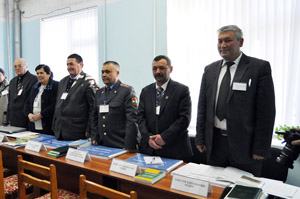One-stop-shop service delivery in Tajikistan
Date:

It is a crisp spring morning in Ghonchi district in northern Tajikistan, and a large crowd of women from across the district have gathered outside of the main government building, the Hukumat. They are here for an historic event - the opening of Tajikistan's first One Stop Shop for public service delivery.
This new initiative means that every Saturday morning, the Chiefs of the most critical government departments will come together in one “service hall of the government building to provide speedy action and services for the local population. UN Women supported the Hukumat and the local Women's Watch groups to conduct a study visit to Moldova, where a similar “Service Halls concept is improving public service delivery to the most vulnerable.
In the weeks preceding the inauguration, the district authorities had advertised the One Stop Shop through extensive outreach via the district's radio and newspaper, explaining its purpose in providing assistance to citizens, particularly women. Based on the Moldovan model, accessing services related to education, health care, social protection, civic registration, passports and land rights will now be much easier for the people of Ghonchi district. Previously citizens would have to go from room to room in the Hukumat building to find the relevant officials, before eventually meeting directly with the top official, Zufar Ismoilov.
The bureaucratic process was challenging, especially for those struggling with illiteracy, poverty, disability and low awareness of their rights and entitlements. Yet with the One Stop Shop, they meet directly with the relevant official for consultation. While in a month Ismoilov would typically be able to meet with only 30 citizens, the One Stop Shop on its first day alone led to a drastic increase in citizens' access to services. More than 55 people were served during the four hours it was open, with more than 70 per cent of those being women.
Among them was a young disabled woman who came with her sister to explore whether she qualifies for any benefits, due to the loss of her leg. She went home happy, having received instructions on how she can be fitted with a prosthetic, free of cost, in the capital city of Dushanbe.
“We have changed the way we as the local government interact with the population; this is the first step towards implementing their human rights, says Ismoilov, who sees the new concept as a revolution in service provision in post-Soviet Tajikistan.
The One Stop Shop staff also plan to visit the outlying rural areas in a mobile clinic three times a month. Outreach will be done by both the district authorities as well as the Women's Watch Groups to ensure that vulnerable women take advantage of the service. The concept is being scaled up and replicated in three other districts of Tajikistan, with UN Women is also giving technical expertise to the provincial government to provide a similar service.